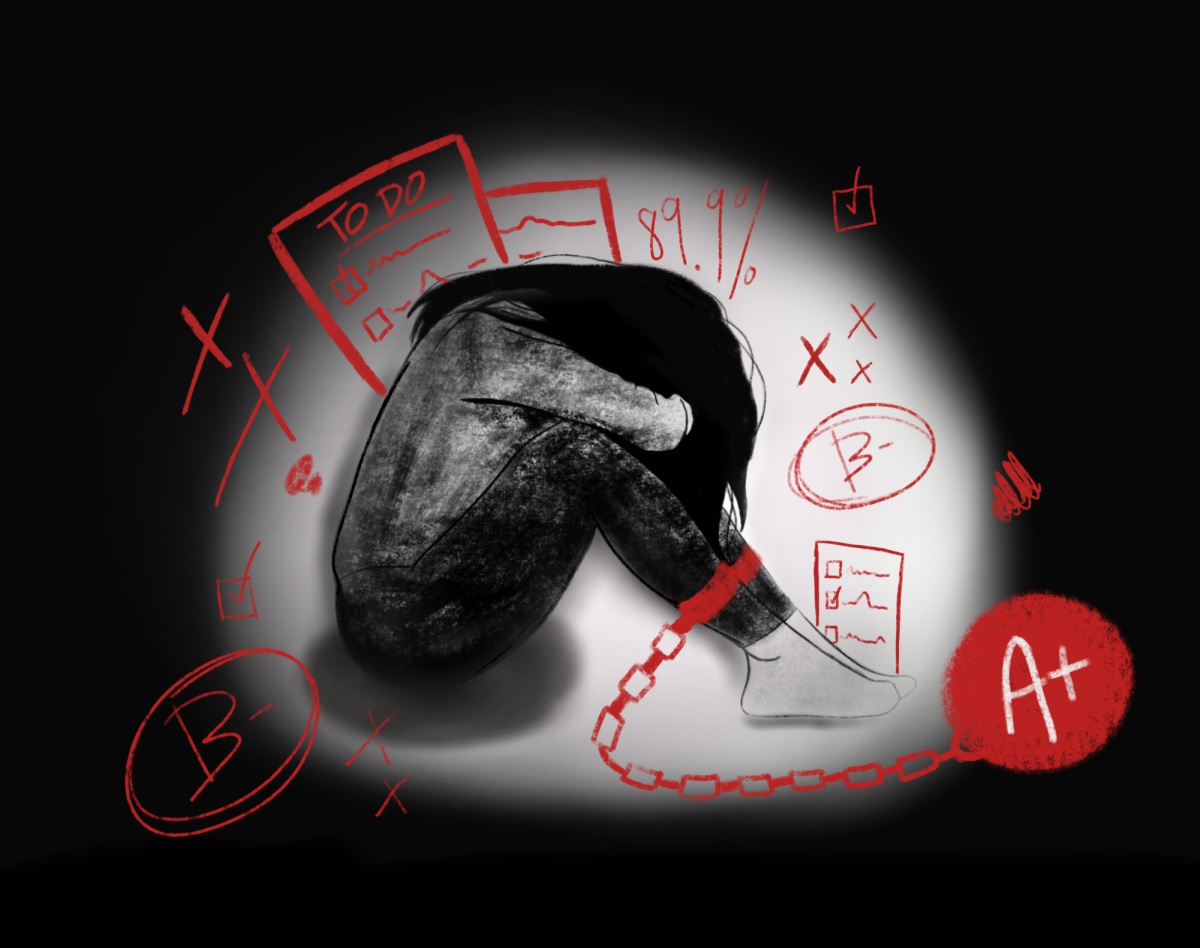Your calculus test stares accusingly at you.
A 65% has been viciously inked in red at the top of the paper, tearing a hole through your chest.
Your expectations for a flawless GPA are crushed as your A in the class plummets to a C. You frantically begin concocting explanations for your parents, burning with anxiety at the thought of their disappointment.
This is a prime demonstration of chronic perfectionism, a phenomenon consuming competitive students at alarming rates. In a society where academic achievement is glorified and the pursuit of perfection is elevated in schools, chronic perfectionism has become a silent epidemic eating away at the well-being of young individuals and shackling the gratification of progress.
Perfectionism is often viewed as a one-dimensional personality trait that strives for impractical excellence. However, researchers have identified three disparate branches of perfectionism: self-oriented perfectionism, an unreasonable desire for flawlessness; socially prescribed perfectionism, or perceiving irrational standards from others; and other-oriented perfectionism, the act of housing unrealistic expectations for others. The hyper-competitive nature of today’s school environments have fueled these toxic tendencies, and it’s high time to acknowledge the chronic perfectionism that has plagued students over the years.
Psychology Today defines perfectionism as the intense craving to be flawless. Chronic perfectionists are notorious for setting absurdly high expectations for themselves. They are quick to condemn their mistakes and easily disheartened at perceived failures. Although perfectionists strive for success, they wrongfully emphasize avoiding error and obsess over meeting their personal standards.
The National Library of Medicine has established that three out of 10 adolescents are afflicted with chronic perfectionism. Furthermore, the American Psychological Association revealed in a 2018 report that perfectionism among young individuals has dramatically increased since 1980, with self-oriented perfectionism growing by 10%, socially prescribed perfectionism by 33% and other-oriented perfectionism by 16%. Modern society contributes greatly to these numbers by placing academic success on a lofty pedestal, paving a dangerous path of comparison and self-sabotage for students.
The competition ravaging through today’s learning environments is astonishing. With acceptance rates in distinguished schools being as low as 3.4%, the perpetual pursuit of exemplary grades and outshining peers has provided the resources for chronic perfectionism to wreak havoc on students’ livelihoods and mental health. Every exam is another opportunity to fail, and every project must astronomically exceed the requirements.
A recent publication by Sage Journals unveiled that up to 30% of students suffering from chronic perfectionism are at an increased risk of anxiety, depression and suicidal impulses. Such an unhealthy mindset can also lead to eating disorders or indicate obsessive-compulsive disorder (OCD). In fact, Mayo Clinic has outlined school-related stress as one of the leading causes of mental illness. Mental health is already a major societal concern, and we must not condone further destruction upon the minds of younger generations.
Not only does chronic perfectionism fan the flames of notable preexisting mental health issues, but it also plays a role in severe indecisiveness. Most individuals will experience indecisiveness at certain moments in their life, but perfectionists endure it routinely, oftentimes at a detrimental level. For instance, an extreme perfectionist may be uncertain of a suitable essay topic, causing them to procrastinate out of fear of choosing the wrong one. Severe indecisiveness partners with unrealistic expectations to suck the pleasure out of learning, promote procrastination and burden individuals with protecting their self-esteem when making decisions. After all, incessantly maintaining one’s self-assurance is the basis of chronic perfectionism.
Acute perfectionism can also spiral into catastrophic thinking, a phenomenon Psychology Today describes as a cognitive distortion that prompts individuals to immediately assume the worst possible outcome. For a severe perfectionist, a troubling situation will rock their world as if a real crisis has occurred. As a student who suffers from chronic perfectionism, this is a disheartening reality. At the sight of one poor test grade, my mind races with dark thoughts of failing the class and being rejected from colleges due to one imperfection.
Burnout becomes an additional concern as chronic perfectionism pushes students beyond their limits. A survey conducted by Handshake, a college career and recruiting platform, revealed that a startling 80% of upcoming college graduates reported a lack of motivation and other symptoms of burnout. High school and college students are the future of the world. The future doesn’t look promising if learners continue to suffer from mental disorders and burnout as a result of their toxic perfectionist tendencies.
A distinction must be made between healthy perfectionism and chronic perfectionism. Healthy perfectionists are achievement-oriented, set ambitious but attainable goals, hold themselves to admirable standards and relentlessly chase success. Conversely, unhealthy perfectionists are failure-oriented, fixated on avoiding blunders and adopting an all-or-nothing mentality.
Some may argue that extreme perfectionism is advantageous for students, as it encourages them to harness their full potential. Of course, sensible perfectionism can be wonderfully beneficial in academic environments, as it promotes excellent work habits and a growth mindset. Competition and self-imposed pressures allow such students to flourish under the appeal of fresh challenges. However, chronic perfectionism adds fuel to the fire of academic struggle rather than dousing it.
As a student with chronic perfectionism, I am struck by how undisclosed this condition remains despite its growing commonality among ambitious students. Although my acute perfectionism largely contributes to my academic motivation, it has inflicted more harm than good on my livelihood and mental health. Throughout my educational career, I have fallen into severe bouts of anxiety due to low exam grades and subsequently believing I’d disappointed teachers. There’s no foolproof cure for chronic perfectionism, but the first step entails raising societal awareness surrounding this issue. Only then, with newfound support, can student perfectionists emerge from their bubble of unreasonable expectations and learn freely, unshackled by self-deprecation and irrational attitudes.
The abridged version of this article appeared in the Spring 2024 print edition. This is an uncut version.



